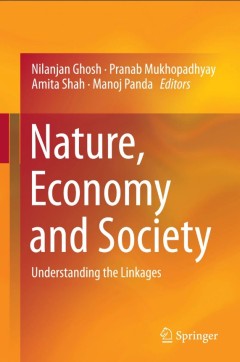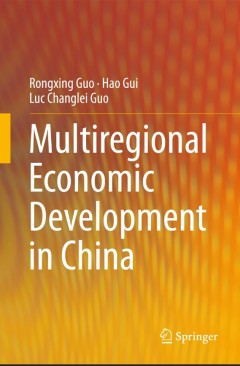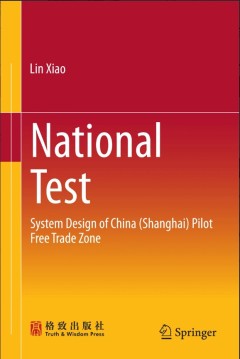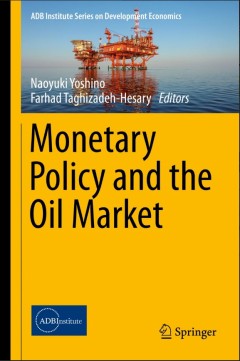Filter by

Nature, Economy and Society:Understanding the Linkages
This book presents an enquiry into the interface between nature, economy and society, which is still in its early stages, notwithstanding the commendable progress and advances made in the field of environmental and natural resource economics within the ever-expanding boundaries of economics as a discipline. It further delineates the evolution of an inter-disciplinary framework for analyzing the…
- Edition
- 1
- ISBN/ISSN
- 978-81-322-2403-7
- Collation
- XII, 357
- Series Title
- -
- Call Number
- -

Multiregional Economic Development in China
This book provides, in an easy-to-use format, an extensive collection of data and information on China’s 31 provinces and its interprovincial economic linkages. Intended as a comprehensive resource book, it profiles the geography, demography, and economy for each province. The materials presented, which are gathered from a variety of sources, including many not easily found in English-languag…
- Edition
- 1
- ISBN/ISSN
- 978-3-662-46619-3
- Collation
- XV, 528
- Series Title
- -
- Call Number
- -

The Twenty-First Century Commercial Space Imperative
Young addresses the impressive expansion across existing and developing commercial space business markets, with multiple private companies competing in the payload launch services sector. The author pinpoints the new markets, technologies, and players in the industry, as well as highlighting the overall reasons why it is important for us to develop space. NASA now relies on commercial partners …
- Edition
- -
- ISBN/ISSN
- 978-3-319-18929-1
- Collation
- -
- Series Title
- -
- Call Number
- -

National Test:System Design of China (Shanghai) Pilot Free Trade Zone
This book discusses the latest developments in the China Pilot Free- Trade Zone strategy. It puts forward and explains the idea that building the Shanghai Pilot Free-Trade Zone (SFTZ) is a national test, as it is a major strategic decision to help China cope with the new situation resulting from opening-up and the further implementation of the reform. Based on China’s strategic demand in the …
- Edition
- 1
- ISBN/ISSN
- 978-981-10-0217-5
- Collation
- XXII, 430
- Series Title
- -
- Call Number
- -

Monetary Policy and the Oil Market
While oil price fluctuations in the past can be explained by pure supply factors, this book argues that it is monetary policy that plays a significant role in setting global oil prices. It is a key factor often neglected in much of the earlier literature on the determinants of asset prices, including oil prices. However, this book presents a framework for modeling oil prices while incorporating…
- Edition
- 1
- ISBN/ISSN
- 978-4-431-55796-8
- Collation
- XVIII, 143
- Series Title
- ADB Institute Series on Development Economics
- Call Number
- -

The Securitization of Foreign Aid
Security concerns increasingly influence foreign aid: how Western countries give aid, to whom and why. With contributions from experts in the field, this book examines the impact of security issues on six of the world's largest aid donors, as well as on key crosscutting issues such as gender equality and climate change.
- Edition
- -
- ISBN/ISSN
- 978-1-137-56882-3
- Collation
- -
- Series Title
- -
- Call Number
- -

Emerging Economies Food and Energy Security, and Technology and Innovation
This volume brings together research on development in three major areas of contemporary global relevance: agriculture and food security, energy, and the institutions of national innovation. Covering six of the largest emerging and developing economies (EDEs) in the world, three Asian (China, India and Malaysia), two Latin American (Brazil and Mexico), and one African (South Africa), the book …
- Edition
- 1
- ISBN/ISSN
- 978-81-322-2101-2
- Collation
- 99 b/w illustrations
- Series Title
- -
- Call Number
- -

The Role of Civil Society in Africa’s Quest for Democratization
This book tests many of the assumptions, hypotheses, and conclusions connected with the presumed role of civil society organizations in the democratization of African countries. Taking a comparative approach, it looks at countries that have successfully democratized, those that are stuck between progress and regression, those that have regressed into dictatorship, and those that are currently i…
- Edition
- -
- ISBN/ISSN
- 978-3-319-18383-1
- Collation
- -
- Series Title
- -
- Call Number
- -
 Computer Science, Information & General Works
Computer Science, Information & General Works  Philosophy & Psychology
Philosophy & Psychology  Religion
Religion  Social Sciences
Social Sciences  Language
Language  Pure Science
Pure Science  Applied Sciences
Applied Sciences  Art & Recreation
Art & Recreation  Literature
Literature  History & Geography
History & Geography